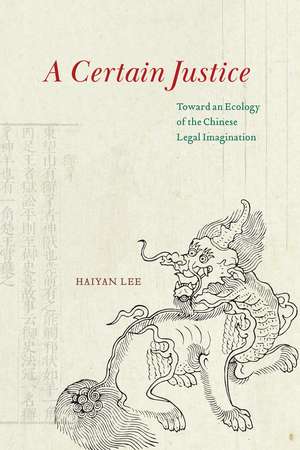A Certain Justice: Toward an Ecology of the Chinese Legal Imagination
Autor Haiyan Leeen Limba Engleză Paperback – 5 iun 2023
To many outsiders, China has an image as a realm of Oriental despotism where law is at best window dressing and at worst an instrument of coercion and tyranny. In this highly original contribution to the interdisciplinary field of law and humanities, Haiyan Lee contends that this image arises from a skewed understanding of China’s political-legal culture, particularly the failure to distinguish what she calls high justice and low justice.
In the Chinese legal imagination, Lee shows, justice is a vertical concept, with low justice between individuals firmly subordinated to the high justice of the state. China’s political-legal culture is marked by a mistrust of law’s powers, and as a result, it privileges substantive over procedural justice. Calling on a wide array of narratives—stories of crime and punishment, subterfuge and exposé, guilt and redemption—A Certain Justice helps us recognize the fight for justice outside the familiar arenas of liberal democracy and the rule of law.
| Toate formatele și edițiile | Preț | Express |
|---|---|---|
| Paperback (1) | 201.40 lei 3-5 săpt. | +19.88 lei 4-10 zile |
| University of Chicago Press – 5 iun 2023 | 201.40 lei 3-5 săpt. | +19.88 lei 4-10 zile |
| Hardback (1) | 593.40 lei 3-5 săpt. | +25.54 lei 4-10 zile |
| University of Chicago Press – 5 iun 2023 | 593.40 lei 3-5 săpt. | +25.54 lei 4-10 zile |
Preț: 201.40 lei
Nou
Puncte Express: 302
Preț estimativ în valută:
38.54€ • 39.82$ • 32.08£
38.54€ • 39.82$ • 32.08£
Carte disponibilă
Livrare economică 04-18 martie
Livrare express 15-21 februarie pentru 29.87 lei
Preluare comenzi: 021 569.72.76
Specificații
ISBN-13: 9780226825250
ISBN-10: 0226825256
Pagini: 352
Ilustrații: 21 halftones
Dimensiuni: 152 x 229 x 23 mm
Greutate: 0.52 kg
Ediția:First Edition
Editura: University of Chicago Press
Colecția University of Chicago Press
ISBN-10: 0226825256
Pagini: 352
Ilustrații: 21 halftones
Dimensiuni: 152 x 229 x 23 mm
Greutate: 0.52 kg
Ediția:First Edition
Editura: University of Chicago Press
Colecția University of Chicago Press
Notă biografică
Haiyan Lee is the Walter A. Haas Professor of the Humanities and professor of Chinese and comparative literature at Stanford University. She is the author of Revolution of the Heart: A Genealogy of Love in China, 1900–1950 and The Stranger and the Chinese Moral Imagination.
Cuprins
List of Figures
Preface and Acknowledgments
Introduction
Chapter 1. High Justice
Chapter 2. Low Justice
Chapter 3. Transitional Justice
Chapter 4. Exceptional Justice
Chapter 5. Poetic Justice
Chapter 6. Multispecies Justice
Conclusion
Glossary
Notes
Bibliography
Index
Preface and Acknowledgments
Introduction
Chapter 1. High Justice
Chapter 2. Low Justice
Chapter 3. Transitional Justice
Chapter 4. Exceptional Justice
Chapter 5. Poetic Justice
Chapter 6. Multispecies Justice
Conclusion
Glossary
Notes
Bibliography
Index
Recenzii
“In place of the stale debate over China’s progress toward a Western ‘rule of law,’ A Certain Justice offers a fresh interpretation of Chinese legal culture informed by China’s own literary traditions. Guiding the reader on a colorful journey from spy thrillers and tales of hypocrisy through contemporary court dramas, Lee reveals a vibrant legal imagination that is hierarchical rather than horizontal, encompassing both the ‘high justice’ of the state and the ‘low justice’ of society at large. The result, she suggests, is an intertwining of law and politics animated by a logic quite unlike that of Western jurisprudence, but no less important for informing conceptions of morality and governance.”
“Lee guides us through the rich terrain of literature and film as material archives to examine the fabric of Chinese justice. By avoiding reliance on legal jurisprudence, Lee charts how the Chinese Communist Party has become the actual arbiter of justice. Her critical examination of the legal imagination in fiction and in history suggests that by ‘positioning itself at the moral-ideological pinnacle,’ the party has been able to demand that its own legitimacy and self-preservation are at the root of justice. Her expansive investigation ranges from prewar texts to literature in postwar spy novels, to animal-themed novels in the twenty-first century. Importantly, Lee’s research explains why the injustice meted out at the lower strata of Chinese society is often seen as an acceptable sacrifice for the ‘high justice’ achieved by the state.”
“This subtle, learned, capacious book looks at China’s alternative to liberalism as a complex interplay between three terms: justice, morality, and law, with law always playing second fiddle (though a necessary fiddle) to the other two. At a moment when the Chinese statist paradigm can no longer be dismissed as an inadequate copy of Western rule of law, this timely study opens up a critical space for reappraisal.”
"By drawing on a vast and diverse body of textual evidence that allows us to better appreciate the vibrant diversity and unique contributions of Chinese justice to global legal cultures, Haiyan Lee has achieved conceptual breakthroughs with the potential to inspire future generations of scholars for years to come."
"While there is already excellent work in the genre of Chinese Law and Literature, this work sets a new standard for the field. Indeed, it far exceeds the bounds of both law and literature, expanding into adjacent fields of legal and literary humanities: history, political theory, moral philosophy, and cognitive psychology, to name just some of the many literatures on which Lee draws in A Certain Justice: Toward an Ecology of the Chinese Legal Imagination. This is a smart and ambitious book filled with exciting local and global insights, some of which are dazzling."
"An ambitious treatise on the concept of justice by exploring law-related themes in Chinese films, TV dramas, theater, poems, novels, and memoirs spanning a period from the 1950s to the 2010s. . . . A Certain Justice offers an erudite analysis of Chinese justice through the lens of law and humanities. [Lee's] ability to make use of different theoretical apparatuses to underline unobvious connections is impressive."
